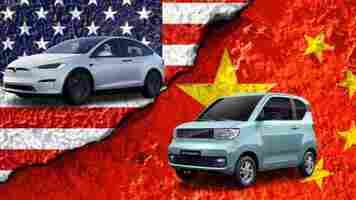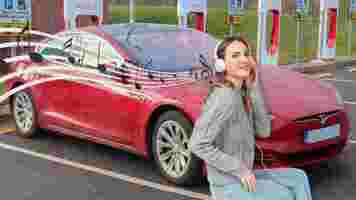Tesla ranks 1st in global battery EV sales, but Chinese automakers get the lion’s share
Battery electric vehicle (BEV) sales have skyrocketed during the first quarter of 2021, according to the investigation by market intelligence company TrendForce . In fact, they have witnessed an impressive 153% increase year-over-year, with 750,000 units sold.

Most notably, their report provided significant insights on the sales ranking. Tesla may have remained the established sales leader with 24.6% market share, but it is the Chinese automakers who collectively hold the largest market share of 25.1%, and who have moved up the ranks compared to last year.
Specifically, Wuling Hongguang, BYD, and ORA take three of the top five spots.
As researched by the company, Tesla owes its first place mainly to the Tesla Model 3 , which exceeded Model Y by more than 50,000 units.
Wuling Hongguang has jumped to the second place leaving behind Volkswagen and BYD, which ranked second and third in the global BEV market last year. That’s thanks to its MINI that is the highest-selling BEV in China for the first quarter of 2021.
Chinese carmaker ORA ranks fifth with its ORA R1 being a very popular vehicle in its home market. On the contrary, NIO takes the seventh place, as its models are relatively higher-priced compared to those of the previous automakers.
TrendForce identifies three reasons why the Chinese automakers hold one quarter of the total BEV market share: China’s vast market, the Chinese government’s push for electric vehicles since March 2021, and online auto retailers’ sales promotions during shopping seasons.
Do EVs excite your electrons? Do ebikes get your wheels spinning? Do self-driving cars get you all charged up?
Then you need the weekly SHIFT newsletter in your life. Click here to sign up .
How Gen Z’s travel behaviors are changing the way we all get around for the better
From the environmental impact of fossil fuel vehicles to heavily congested roads, our relationship with transport has to be re-examined. A carrot and stick approach is often used to encourage change – but there are other notable drivers.

Enter Generation Z (Gen Z). Born between the mid-1990s and 2010, they make up 32% of the population, according to UN and Bloomberg data – more than the number of millennials and baby boomers. As early adopters of ride sharing and micromobility, their collective ‘buying power’ could have a positive impact on urban mobility.
Their influence on the transport sector over the next decade raises some important questions. How can mobility providers capture the interest of these young commuters as they enter the workforce and support their green values? What opportunities does Mobility as a Service (MaaS) provide for local transport authorities to connect with Gen Z?
Commodity perspective
Answering these questions starts with understanding how Gen Z view transport. An Allison+Partners U.S. study, “ The Birth of Mobility Culture ,” places them at the forefront of a ‘Me’ to ‘We’ cultural shift. At ease with connected technology, they are both socially and environmentally aware, signaling a change in attitude from previous generations.
This perspective extends to transport too. The Allison+Partners study found Gen Z, viewed cars like appliances – nearly 56% saw them as just a means of transport. Unlike previous generations, cars do not define their identity, they are effectively a commodity. Given 70% of Gen Z have not gained their driving license and 30% are in no hurry to get one, car ownership is clearly not a priority.
Different values
This means that mobility providers and manufacturers need to rethink how they engage with Gen Z. Rather than focusing on, for example, a car’s looks, speed and other form factors, efficiency, sharing, sustainability and overall experience may be more suitable talking points.
Take the rise in popularity of on-demand e-scooters among younger generations in the Spanish capital of Madrid . With this move from ownership to usership comes a less polluting way to move around, making our urban areas more livable. Of course, many decisions may depend on life stage such as career plans or starting a family.
However, Gen Z has access to more modes of transport than ever before to influence their choices. Micromobility is becoming increasingly popular in cities across the globe and the expectation is that autonomous vehicles will be a viable mode of future transport too.
MaaS connection
It is important that local transport authorities embrace this and provide the tools to access a wide plethora of services. Few Gen Z have known life without technology, as reflected in research by Adobe – and 46% want apps and services to book, track and manage trips. MaaS is perfectly placed to provide the personalized experience they desire, considering 65% are constantly connected while traveling and expect to change everything from accommodation and itineraries to transportation on the fly.
MaaS apps also allow transport operators and local authorities to connect with this digital tribe in a way not seen before – and understand what makes them tick. A study by Expedia ‘ How Younger Generations are Shaping the Future of Travel ’ found that 70% look to their smartphone for ‘inspiration’ while 80% consider social media ‘influential’.
Not only can MaaS provide Gen Z with intelligent search results based on personal preferences – including modality, time, frequency, cost, comfort and CO2 emissions – it also allows them to tailor their transport and lifestyle choices accordingly. PTAs and mobility providers can capture data and garner feedback to help improve service provision and better understand what customers value most.
Smarter future
One thing is for sure: tech-savvy Gen Z expect more from their journeys, creating opportunities for smarter engagement with these travelers. From incentivizing shared travel and lower CO2 transport modes to offering contextual promotions and entertainment, MaaS moves beyond a simple travel app to meeting lifestyle needs too.
It calls for PTAs to take a collaborative approach with Gen Z to establish a transport system that is more sustainable, active and intelligent. There is the potential for urban planners to repurpose existing infrastructure too, creating safer cycling routes, wider footpaths (that are also wheelchair friendly), more electric vehicle charging stations, convenient pick up/drop off zones and ensuring that micromobility and shared vehicles are well-positioned for accessibility – particularly for the first/last mile.
Not only will Gen Z reshape transport by their travel behaviors, they will also be the mobility entrepreneurs and city planners of the future. From usership over ownership to a culture of ‘we’ rather than ‘me’, Gen Z will steer the course of mobility in the years ahead. With MaaS at the core, this generation could be the one that demands greener, cleaner mobility, finally making our built environments more sustainable for the benefit of us all.
This article was written by Sandra Witzel, Head of Marketing at SkedGo, on The Urban Mobility Daily , the content site of the Urban Mobility Company, a Paris-based company which is moving the business of mobility forward through physical and virtual events and services. Join their community of 10K+ global mobility professionals by signing up for the Urban Mobility Weekly newsletter . Read the original article here and follow them on Linkedin and Twitter .
SHIFT is brought to you by Polestar. It’s time to accelerate the shift to sustainable mobility. That is why Polestar combines electric driving with cutting-edge design and thrilling performance. Find out how .
Stay at home and listen to these 5 podcasts on the future of mobility
Hopefully, this festive period, you’ll have time to relax, unwind, and maybe even listen to a podcast or two.

If you’re into all things mobility tech, let us lend a helping hand and offer some suggestions for you to check out.
1. The Autonocast
If EVs, self-driving vehicles, and autonomy get your motor running, then you should check out the Autonocast
It’s a weekly show that discusses some of the industry‘s most important topics, and is hosted by TechCrunch senior reporter Kirsten Korosec, TheDrive’s Alex Roy, and Ed Niedermeyer who is the comms director at non-profit PAVE (Partners for Automated Vehicle Education).


The Autonocast has previously discussed Tesla’s self-driving technology, women in autonomy and AI bias, and autonowashing.
A personal favorite episode was when the Autonocast interviewed human-machine interaction researcher and friend of SHIFT Liza Dixon about her work into autonowashing.
2. The War on Cars
Now, this might sound a bit off-piste for a publication that focuses predominantly on cars and motorized transport, but hear me out.
We believe that there should be options, and those options should be chosen mindfully. Cars are great and have their uses, but so do trains, planes, and bicycles.
The War on Cars podcast takes a look at the effect cars are having on our roads, cities, and quality of life. As cities like Amsterdam and Copenhagen show, car-free roads can work and can make cities more delightful to live in.
Really, this podcast is about challenging the normative belief that driving a car is the best form of transport for all situations.
A great starting point is this episode: America’s love affair with cars . It makes a potted history of how the US got so wrapped up in a world where everyone has to drive.
3. The Mobility Podcast
Those two podcasts were kind of specific, so let’s zoom out a little and take a look at The Mobility Podcast . As its name suggests, it’s a more of a general look at the field of transport and travel tech, with a specific focus on the US.
On the podcast, hosts have spoken to industry names from the likes of Nuro, Waymo, Segway-Ninebot, and Spin.
The hosts have a background in transportation policy, governance, and strategy and actively look to deconstruct these in pursuit of understanding how new transport tech will impact our societies.
One of my favorite episodes was where the Mobility Podcast took a look at Sweden’s approach to autonomous vehicles . Much of the conversation of self-driving focuses on the US, it’s an important reminder this is a global phenomenon and every culture has a different approach.
4. The Swifty Podcast
If you’re following the conversation surrounding micromobility, in particular escooters, then the Swifty Podcast is for you.
Presented by husband and wife team and founders of scooter company Swifty Scooters, Jason and Camilla Iftakhar, the Swifty Podcast dissects everything to do with the world of stand-on two-wheeled transport.
In previous episodes Jason and Camilla have covered how their supply chain works, how they design their scooters, and how legislation and infrastructure impacts their use and uptake. Conversations go into a surprising amount of detail.
It’s all totally unscripted, but after listening to a bunch of episodes myself, I can say that it provides a unique window into the challenges of bringing new modes of personal transport to life.
A personal highlight was episode #18, published in August . It looked at how COVID-19 has affected the UK escooter market and how the areas the nation’s trials of the tech are likely to fail and succeed.
5. BCG: Podcasts on the Future of Mobility
If you’re not in the game of big business and corporate strategy, you might not know BCG, or Boston Consulting Group to give it its full name.
BCG is a business strategy consulting firm, and is the hive mind behind the Boston Matrix, which is used by firms to understand and strategize their product line up. The concept is even taught in universities across the land.
The business world is going to change dramatically as we switch to electric cars, autonomous vehicles, and new models of shared ownership, so it’s not surprising a firm like BCG is keeping an eye on things.
In short, the big wigs at BCG know how the automotive industry works, and in this podcast industry experts explore the impact that these new technologies will have. If you’re deep into the futurism of transport, get this podcast into your ear holes.
BONUS: Car Talk
Car Talk on NPR is an absolute must-listen podcast whether you’re a car nerd or not. Props to my colleague Georgina for getting me on to this one.
Car Talk was broadcast on NPR from the late 1970s through to 2012. Now, re-cuts of original episodes are released as podcasts, under the “Best of Car Talk” moniker.
It’s hosted by brothers Tom and Ray Magliozzi, AKA “Click and Clack, the tappet brothers.” After a long career as car mechanics, they took to the airwaves to help callers with their own car troubles, and do so always in hilarious fashion.
So it might not be about the future of mobility, but I can guarantee that it’ll bring a smile to your face.
SHIFT is brought to you by Polestar. It’s time to accelerate the shift to sustainable mobility. That is why Polestar combines electric driving with cutting-edge design and thrilling performance. Find out how .